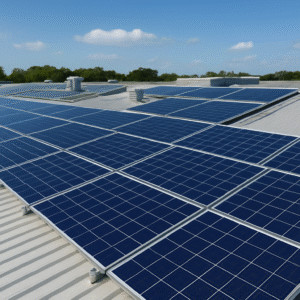In Gujarat’s thriving industrial sector, where energy costs can make or break profitability, the Renewable Energy Service Company (RESCO) model is emerging as a transformative approach to solar adoption. For factories and commercial buildings dealing with high electricity tariffs (often ₹6-8 per unit), RESCO offers a zero-upfront-cost pathway to clean energy. Under this model, a third-party developer like Akuntha Projects Private Limited installs, owns, and maintains the solar plant, while you pay only for the generated power at a discounted rate. This guide delves into the RESCO framework in Gujarat, highlighting recent Gujarat Electricity Regulatory Commission (GERC) resolutions that bolster its viability for industrial users, along with practical benefits, guidelines, and savings projections.
What is the RESCO Model?
The RESCO model, also known as the OPEX (Operational Expenditure) model, shifts the financial burden of solar installation from the consumer to a specialized developer. Key elements include:
- Ownership and Maintenance: The RESCO provider finances, designs, installs, and operates the solar system for 10-25 years.
- Power Purchase Agreement (PPA): Industries sign a long-term PPA to buy electricity at a fixed or escalating tariff, typically 20-40% lower than grid rates.
- No Capital Investment: Ideal for cash-flow-conscious factories, as there's zero upfront cost.
- End-of-Term Options: At PPA expiry, the system can be transferred to the user at nominal cost, renewed, or dismantled.
In Gujarat, RESCO aligns with the state’s Solar Power Policy 2021 (extended till December 31, 2025), which promotes commercial and industrial solar without capacity limits. This policy offers 100% exemption from electricity duty and supports net metering for excess power export.
For more on Gujarat’s solar incentives, visit the Energy and Petrochemicals Department.
Recent GERC Resolutions Impacting RESCO for Industrial Solar
GERC has been proactive in updating regulations to accelerate renewable adoption, with several 2024-2025 resolutions enhancing RESCO’s appeal for industries.
- RE Procurement Regulations 2025 (August 2025): GERC set escalating Renewable Purchase Obligation (RPO) targets, starting at 29.91% for 2024-25 and reaching 43.33% by 2029-30. This mandates industries (as obligated entities) to source more RE, making RESCO an efficient compliance tool. Energy storage obligations (1% in 2024-25, up to 3.5%) further encourage hybrid solar setups under RESCO.
- Rooftop Solar Guidelines Amendments (September 2024): Aligning with national rules, GERC simplified installations: no system strengthening charges for up to 6 kW, no technical feasibility study for up to 10 kW, and streamlined timelines. While primarily for smaller systems, this reduces barriers for industrial rooftop RESCO projects, especially hybrids with net metering.
- PM-KUSUM Component C Approvals (August 2025): In Petition No. 2398/2024, GERC approved tariffs (₹2.13-₹3/kWh) for 276 MW solar projects under RESCO for agricultural feeder solarization. Though focused on agri, this sets precedents for competitive tariffs and streamlined bidding in RESCO, indirectly benefiting industrial applications by demonstrating model viability. Similar approvals for 160 MW and 76 MW projects underscore GERC's support for RESCO in scaling solar.
- RE Policy Amendment (August 2025): Small-scale solar projects up to 5 MW can now sell power to DISCOMs without competitive bidding, facilitating quicker RESCO setups for mid-sized industries.
These updates, combined with national schemes like PM Surya Ghar, make RESCO more accessible. For full orders, check GERC’s portal.
How RESCO Works for Gujarat Industries
Gujarat’s high solar irradiance (1,500-1,800 kWh/kW/year) makes RESCO highly profitable for energy-intensive sectors like textiles, chemicals, and manufacturing. Here’s the process:
- Site Assessment: Evaluate roof/ground space (8-10 sqm/kW for rooftop; 20-25 sqm/kW for ground-mount).
- PPA Signing: Agree on tariffs (₹3-5/unit, fixed for 20-25 years) and terms.
- Installation: RESCO handles approvals via Akshay Urja Setu portal, grid connectivity through GETCO/DISCOMs like PGVCL.
- Operation: Net metering for excess; banking charges apply (₹1.10-1.50/kWh for MSMEs/industrials).
- Savings Realization: Immediate bill reductions, with ROI through lower effective costs.
Eligibility: Open to all industrial consumers; no capacity cap under state policy. Integrate with schemes like Accelerated Depreciation for tax benefits.
For guidelines, refer to GEDA
Benefits and Savings Under RESCO
RESCO eliminates capex risks, ensuring 95%+ uptime and maintenance coverage. Industries can achieve 30-50% savings on energy bills, plus environmental perks like carbon credits.
Sample Savings Table for Gujarat Factories (Assuming ₹7/unit grid tariff, 1,600 kWh/kW/year generation, ₹3.5/unit RESCO tariff)
| System Size | Annual Generation (units) | Annual Grid Cost Without Solar (₹) | Annual RESCO Payment (₹) | Net Annual Savings (₹) | Payback Equivalent (Years)* |
|---|---|---|---|---|---|
| 100 kW | 1,60,000 | 11,20,000 | 5,60,000 | 5,60,000 | Immediate (No Capex) |
| 500 kW | 8,00,000 | 56,00,000 | 28,00,000 | 28,00,000 | Immediate |
| 1 MW | 16,00,000 | 1,12,00,000 | 56,00,000 | 56,00,000 | Immediate |
*Notes: Savings account for 5% annual escalation; banking charges deducted. Actuals vary by location and PPA terms. Use MNRE’s calculator for estimates.
Unlocking Cost Savings: How Solar Plants Can Slash Energy Bills for Gujarat Factories
Challenges and Solutions
Challenges include PPA lock-ins and grid integration delays. Solutions: Choose experienced EPCs for seamless execution; leverage GERC’s streamlined processes.
Why Choose RESCO with Akuntha Projects?
As a Gujarat-based EPC expert, we specialize in RESCO for industries, handling everything from feasibility to PPA. Contact us for a customized proposal.




